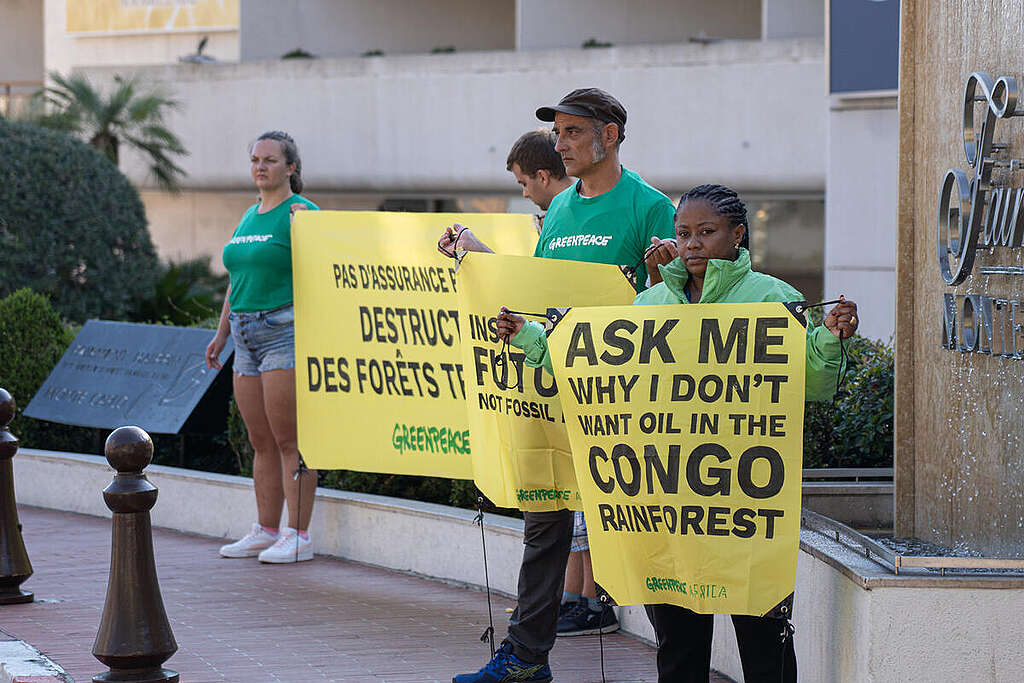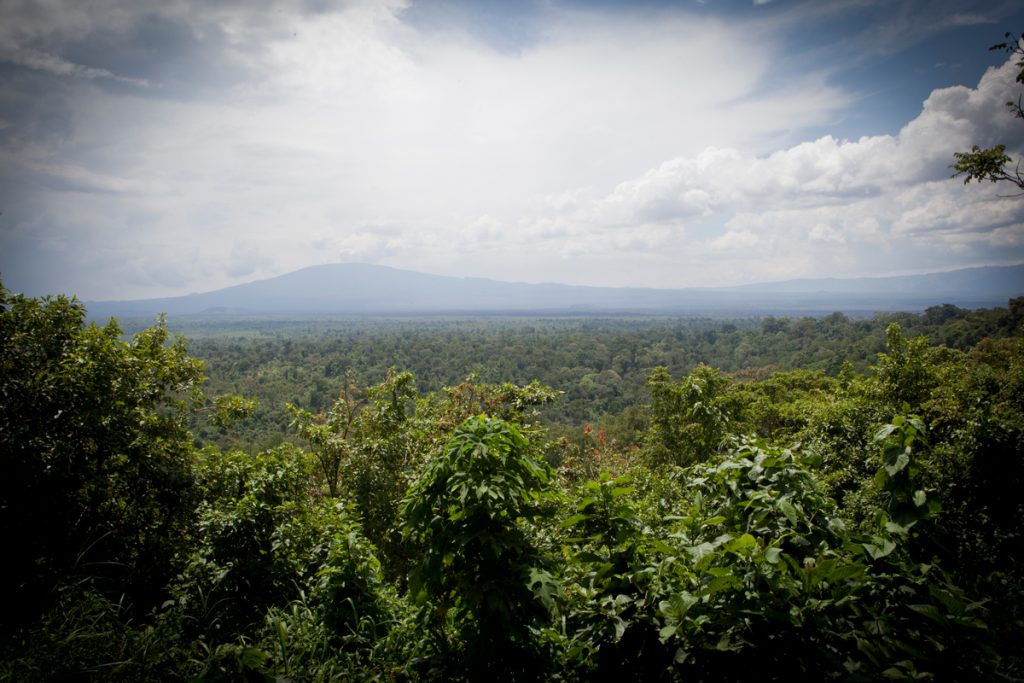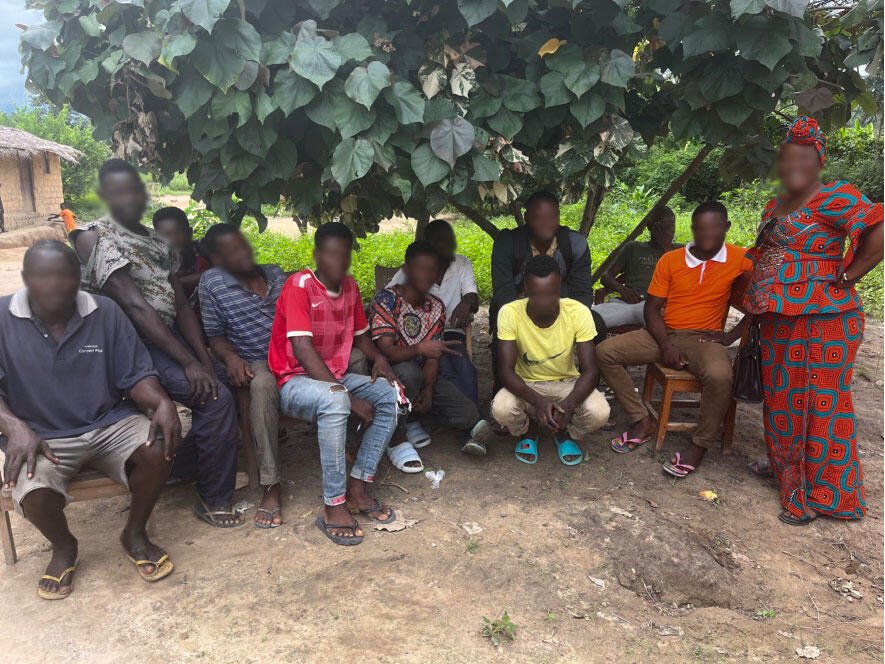Fossil fuel companies are gearing up to bid for the right to drill for oil and gas in the Congo rainforest.

The government of the Democratic Republic of Congo (DRC), where large parts of the Congo Basin rainforest – the world's second biggest intact rainforest – lie, is auctioning licences for oil and gas exploration, which it claims will help Congolese people by providing investment and income to boost the economy. Instead, it will cause untold damage to the forest and the ancestral lands of Indigenous Peoples, as well as being really bad news for the climate.
However, there's a chance that the oil projects won't even get off the ground. Greenpeace Africa has just published a new analysis that shows it will be very difficult and expensive, if not impossible, for oil companies to get insurance cover. And without insurance, these projects simply won't happen.
'The worst place to drill for oil'
The DRC government plans to auction the exploration rights for 30 oil and gas blocks, covering an area larger than the United Kingdom. Some of the blocks overlap with protected areas, including Virunga National Park, a World Heritage Site that's already threatened by armed conflict and now by the prospect of drilling.

Other blocks are in the peatlands of the Cuvette Centrale, which store about 30 gigatons of carbon, equivalent to three years of global fossil fuel emissions.
Africa's peatlands are vital for biodiversity and climate stability.
They store 30 BILLION TONNES OF CARBON in the Congo Basin alone, making them crucial for mitigating climate change.
However, they continue to face threats from oil, logging, and infrastructure development.
— Greenpeace Africa (@Greenpeaceafric) September 12, 2023
What's worse is that local communities have been kept in the dark - they haven't been consulted about the destruction and pollution these oil companies will bring. I have spoken to people who were shocked by the news that their land was being auctioned off to oil companies, although now they know about the plans they are organising and resisting.
Simon Lewis, a professor at Leeds University and head of a British-Congolese research group called CongoPeat, has called the DRC blocks "the worst place in the world to drill for oil". And even if exploration reveals no commercial-scale oil fields, it will seriously damage the rainforest's biodiversity and the ancestral lands of Indigenous Peoples.

Why insurance companies are so important
For all of these reasons, providing financial support for fossil fuel projects in the DRC is a risky business. Insurance companies, whose business is all about guarding against risk, should be acutely aware of this. Without insurance, it would be impossible for companies to raise the finance for oil and gas exploration, so insurance companies are in a powerful position when it comes to putting the brakes on fossil fuel expansion.
Greenpeace Africa's analysis - conducted with partners Urgewald and Insure Our Future - shows that some definitely are. We looked at some of the biggest insurance and reinsurance companies to assess what specific commitments they have made about the DRC auction, and their policies on environmental, social and governance (ESG) issues in general.
BREAKING!
We're in the very wealthy & prominent Monte Carlo. Why?
To confront two of the most powerful insurance companies, @AIG and @LloydsofLondon, to tell them to stop supporting destructive & exploitative projects like the DRC oil auction in the Congo Basin Rainforest.
— Greenpeace Africa (@Greenpeaceafric) September 11, 2023
Some companies have said they have no intention of providing insurance services as part of the auction, while others have policies in place that should prevent them from being involved or have commitments not to back new fossil fuel projects. This includes some of the biggest insurance companies in the world, including Allianz, Hannover Re, Munich Re and Swiss Re.
Sounds good, but it's not enough. Most insurance companies have environmental or net-zero policies, and yet companies are still getting insurance and raising financing to find more fossil fuels. To prevent this, insurance company policies of among others AIG and the Lloyd's of London need to be strengthened and the big players need to make specific commitments to rule out backing for fossil fuel exploration in the DRC.
With those in place, the Congo rainforest, its people and its wildlife will be protected from destructive oil and gas companies.
Irene Wabiwa is International Lead of the Greenpeace Africa Congo Basin campaign.







